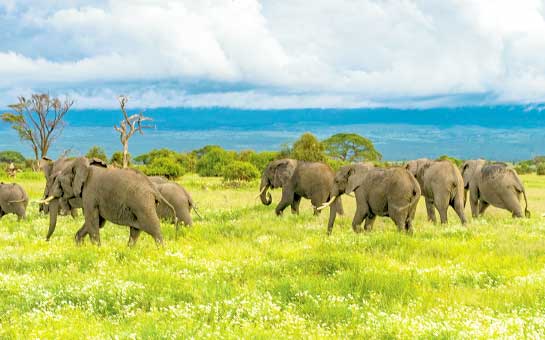The Republic of Kenya is an independent country in East Africa, known for its spectacular wildlife reserve at Maasai Mara. The country is home to the people of the Bantu and Swahili cultures, along with various other tribes.
The country has seen many uprisings from the Mau Mau communities in the past, and conflicts with Somalia were also common at one point. The country was also colonized by the Portuguese and, later, Arabs and Persians settled here in considerable numbers.
Kenya is a traveler’s delight, featuring mountains, forests, wildlife, and stunning Portuguese and tribal architecture waiting to welcome tourists. And before you leave, be sure to purchase travel medical insurance to stay protected against any unexpected illnesses, accidents, or injuries that might occur.
Kenya Travel Medical Insurance for International Travelers – FAQs
Medical insurance will help cover any costs of treatment should you fall sick or if you are injured.
Do I need travel medical insurance for Kenya?
Travel medical insurance is not mandatory if you plan a trip to Kenya. However, it is only common sense to have travel health insurance for Kenya, especially in an unfamiliar environment far from home.
Why buy travel medical insurance for Kenya?
Kenya is as wild as it is beautiful, and emergencies might arise any time due to the volatile nature of some of the locals near the borders. Natural disasters like forest fires and injuries related to animal attacks or insect bites are also common.
A comprehensive travel medical insurance will help cover the cost of treatment for injuries and accidents, and it would provide coverage for medical evacuation as well, should the need arise.
Things to Do for Travelers in Kenya
- A trip to Maasai Mara Reserve: Perhaps the most famous wildlife reserve in the world, Maasai Mara lies in the northern extension of the Serengeti. The reserve is most famous for the Great Migration, between July and October, when zebras, bison, and gazelles travel from one part of the Serengeti to the other. A safari will take you right up to the Mara River, where you can watch hippos and crocodiles in their natural habitats.
- Elephant spotting at Amboseli: Anyone who appreciates the majesty of African Elephants will not want to miss the opportunity to see them at close range. The Amboseli National Reserve, at the base of Mount Kilimanjaro, is home to these majestic beasts, along with lions and cheetahs, as well. The people of the Maasai tribe also live around the park.
- A trip to Lamu Island: This island, a UNESCO World Heritage Site, lies northeast of Mombasa. The Lamu Old Town is home to some of the most stunning architecture in the country, with influences from Arabian and European countries merged with Swahili technique. The Lamu Museum and Lamu Fort are home to many relics of Swahili culture, and also artifacts dating all the way back to the Stone Age.
- City walk through Nairobi: Nairobi, the capital of Kenya and its largest city, is perhaps one of the most colorful in the world. The street markets come alive with vendors selling handcrafted goods. You can also enjoy Portuguese, Swahili, and even Arabian food at its many restaurants. The museum here is a major attraction, and the black rhino sanctuary is just a few minutes outside the city.
- Relax on Malindi Beach: From the forests, you can head straight to the exotic beach at Malindi. There are plenty of resorts here, and the waters are pristine. Scuba diving is a popular sport that allows you to see coral reefs up close. The city also has great historical significance, with some of East Africa’s oldest churches located here, along with some spectacular mosques.
Travel Risks for International Travelers in Kenya
Here are some of the things to watch out for on your trip to Kenya.
- Unrest near the borders: Kenya often has altercations with neighboring countries like Somalia, Ethiopia, and Sudan. Infiltration and cattle rustling are very common. Stay clear of these areas so as not to get caught up in the crossfire.
- Petty crime: Do not walk along the beach late at night, and always take a taxi if you have to travel alone at night.
- Bandits: Bandits, locally known as shiftas, sneak into the land from neighboring Somalia. Avoid traveling in the rural areas late at night, if possible.
- Insect bites: Not just in the forests, but even in urban areas, you need to be careful of harmful insects, as they are a part of the urban wildlife in the region. Mosquitoes, scorpions, biting wasps, and other insects can cause infections and illnesses if you are not careful. Acacia thorns can even tear through rubber, so wear heavy footwear while hiking.
- Stomach problems: Avoid eating raw or undercooked food in Kenya as much as possible. Drink boiled or mineral water to avoid stomach problems.
Before You Travel to Kenya- Do This
- Check all your documentation. If you want to travel to the many national reserves in the country, make sure you have the necessary permits, especially in Maasai Mara.
- Always carry mosquito-repellent spray with you, and if possible, a first-aid kit including bandages and antiseptic. These are the first things you will need in case of an insect bite.
- Always travel with licensed rentals. Book your rentals and taxis in advance if you have to travel by night.
- Make sure you are not traveling too close to the borders. Stay updated with the local news if you have to change your itinerary so that you can avoid traveling through those areas.

